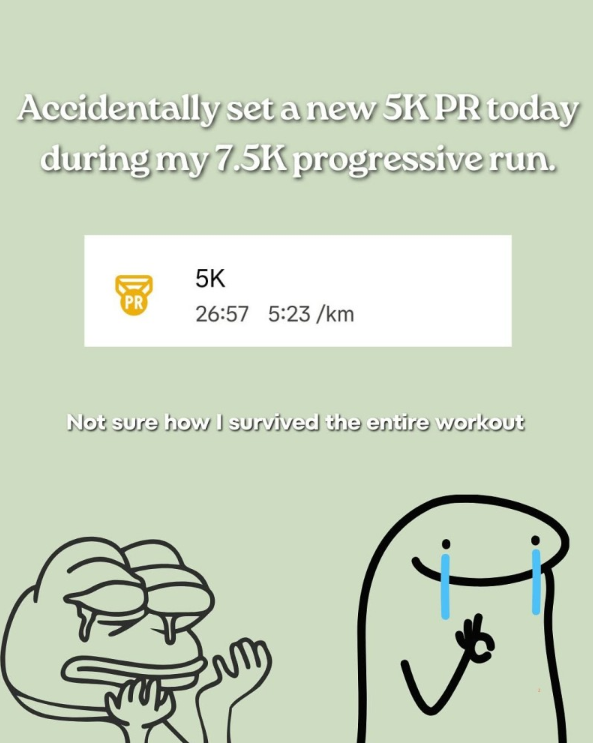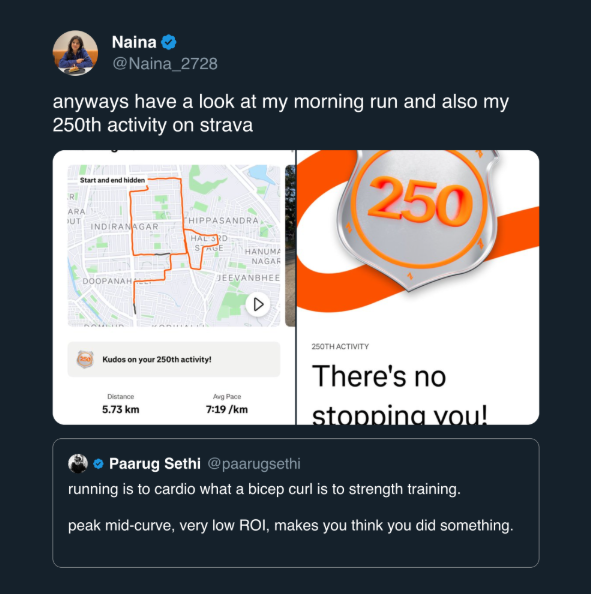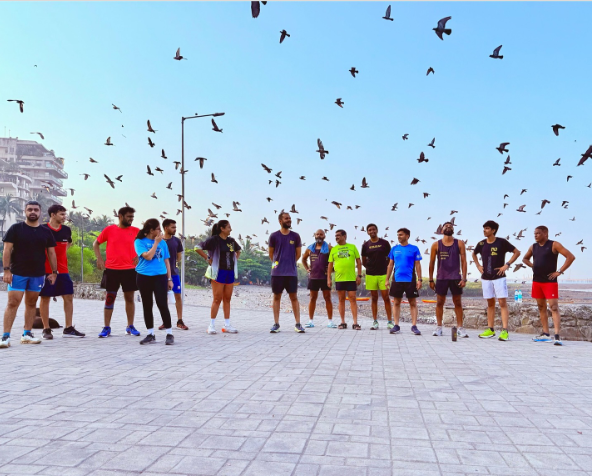At a time when Indians are increasingly concerned about their health as well as crave offline experiences, the average person can check off two goals at once — a workout and a social fix — just by showing up to a run club.
–
When Akshada Patil (28) began running through Mumbai’s bustling lanes two years ago, she longed for a community where she could run, chat and befriend fitness enthusiasts her age. Inspired by the concept of ‘run clubs’ abroad – where individuals run together for fun or to train for races – Patil and her boyfriend Rhythm started a similar group in Mumbai in 2024, initially as an invite-only gathering. Today, Patil – popularly known as Overlydaa to her 269K Instagram followers – has built a vibrant running community in the city, hosted over 25 runs, and partnered with brands like Puma and Red Bull. Her club is one of the many consumer-led running clubs sprouting up across major Indian cities as well as smaller towns where communities such as Bombay Running, Pudhe Chala Mumbai, and On Tour Club have gained traction.
Fitness giants like Nike as well as tangential brands like Bumble are taking note of this proactive consumer attitude towards sport. Nike is set to host the ‘After Dark Tour’ — a 10km evening run in Mumbai designed to spotlight women in the running community in May this year (2025). On Valentine’s weekend, Bumble teamed up with Puma to host a ‘Rundowner’ calling singles to “lace up, link up” – a unique way to mingle and date through the shared experience of running. Even corporate behemoths like Airtel, Tata Consultancy Services, Vedanta, and Bisleri have been sponsoring marathons across the country. It’s no surprise that these initiatives come at a time when amateur running is rapidly emerging as one of India’s fastest-growing sports.
TWO FOR ONE OFFER
The rise of run clubs reflects a larger shift — wellness is now non-negotiable for urban Indians. Factors like post-COVID health awareness, medical inflation, and climate anxiety have nudged people to take proactive control of their fitness. In fact, a 2022 Mintel report shows that 43% of Indian millennials (25 - 40) are spending more on healthy food options, 41% on activewear and 36% on gym equipment and fitness wearables.
At a time when Indians are increasingly concerned about their health, run clubs have become a consistent ritual that addresses two major consumer needs – unlike more solitary workouts like yoga and pilates, run clubs blend fitness with friendship. The average person can check off two goals at once — a workout and a social fix — just by showing up to a run club.
Active nutrition brand Fast&Up has maintained a strong presence in the running community for a decade, partnering with Jayanagar Jaguars and Mumbai Road Runners, as well as the Adidas Runners community in Mumbai, Delhi, and Bengaluru. Rohan Manglani, head of marketing at Fast&Up, anticipates continued growth in this space. “The popularity of running culture is not a fad… It’s 100% going to get bigger because running is a sport growing globally,” he says. “In a country like India, it's one of the more accessible sports and also great for mental health. More and more people are going to take to running.”
SHARED NOT SOLITARY
According to a report by fitness tracking app Strava, 2024 saw a huge rise in run clubs globally, with ‘making social connections’ as the lead motivator for people to exercise. “It’s great to see that people have been starting to run as early as 7 a.m. It’s become like a cultural thing that ‘Let’s go to a run club and grab a coffee later,’” says Patil. For many urban Indians, run clubs are becoming a modern-day third space – a social environment beyond home and work that is a healthier alternative to doom scrolling.
Beyond fostering individual, one-on-one friendships, Patil believes social media helps promote running as a collective activity. People often track their runs on apps like Strava, Nike Run Club or Adidas Running and post those stats on Instagram or X in an effort to stay accountable, earn some cheer squad energy, and turn sweaty miles into social fuel. “I spam a lot about running on my Instagram page. A follower who might be watching that must be feeling, ‘Let's experience what she's doing,’” says Patil.

Deepak Oberoi, co-founder of Bombay Running, feels people attain “social acknowledgement” from running. “Through your Strava stats, everybody in your office will get to know that you’ve done a 5K… So when you get that social acknowledgement, you are tempted to do better next time,” he says. Though the brand positioning of sport as a shared experience is currently trending, it’s not a new strategy.
French sports retailer Decathlon has established dominance in the Indian market with its own communities and over 2,000 runners in Mumbai alone. “Every Decathlon store has two major communities – a Decathlon running club or a Decathlon cycling club. It helps us be in touch with users and take their feedback,” says Sreeya Shetty, marketing lead at Decathlon Mumbai. “We sell running accessories which are exclusive to Decathlon. We understood the need for it after building a relationship with consumers… They would tell us, ‘Why don't you give us a small waist bag where I can keep my keys, all the essentials that I will need so that I don't have to get my car when I'm coming to this place for running?”

FITNESS AS FUN
India is witnessing another major cultural shift – if staying healthy is non-negotiable, it doesn’t also need to be a chore. Pune’s We Persist Club, co-founded by Sumedh Belsare and Siddhi Surve in August 2024, gained popularity earlier this year for its after-parties, where runners party over coffee and house music on Sunday mornings at a premium fitness hub. “During runs, we always have some music on a speaker so the vibe is good overall. So we thought, why not have a live set by one of the house music artists? People loved it,” says Belsare. We Persist Club has since partnered with local cafes and larger brands like Blue Tokai for post-run coffee events.
The “run and rave” scene has also proven popular in cities like Mumbai, New Delhi and Bengaluru. In March, Patil led an early morning run on Carter Road that ended with an after-party at Juhu’s One8 Commune. “Due to the Lollapalooza music festival at that time, many people from other states such as Kerala, Karnataka and Pondicherry turned up for this rave… It was surprising that they attended the festival on Saturday and the next morning, they were there to run and rave,” she says.
While many run clubs focus on community experiences, others take a more structured approach to fitness – one aligned with yet another massive cultural shift in India: the rise of interest-based communities. Bombay Running offers a space to refine technique, prevent injuries, and train with purpose. “We help people if they want to lose weight, get their sleep pattern back on track or have a more realistic and holistic approach towards their health,” said Oberoi, whose community was founded in 2017 and has 60 active runners. “Once people start running, they want to get fast, but most end up with injuries… We believe that people should stay in the sport for a longer duration and that’s how the run clubs will function.”

THE NEXT FRONTIER
As run clubs evolve – from casual meetups to intentional community-building efforts now backed by brands – they are evidence of how India’s urban youth is reshaping its approach to fitness and socialising.
Participating in fitness activities is no longer rooted solely in concern for your individual health – it’s an effort to find belonging in an increasingly fragmented world. Today, amateur sport – whether run clubs or pickleball or padel – is geared towards sparking connection; it’s a first-step into community. However, the next frontier of India’s run club movement will hinge less on volume of connection and more on depth — moving beyond “just show up” into helping build hyperlocal ecosystems where connections are meaningful, reliable and sustainable. Think of modern-day villages where communities co-create not just routes but rituals, relationships and culture – from clubs, activities to even products like merch, DIY magazines and newspapers and events.
Smart brands will see run clubs not just as fitness groups, but as growing cultural communities where they can empower runners to thrive – whether specialised gear suited for Indian climates and lifestyles or funding neighbourhood clubs. The opportunity goes well beyond sponsorships and temporary brand activations – it is in co-designing functional utilities that can act as urban landmarks like hydration stations, drop-in lockers, rest stops, and even long-term R&D programs to facilitate hyper-local sports education. Though not hyperlocal, podcasts from wellness company Ultrahuman and entrepreneur Nikhil Kamath are strong examples of community education initiatives.
Companies like Nike, Puma and Adidas are obvious heavy-hitters in this space, however the opportunity to capture cultural capital goes well beyond obvious sportswear and fitness brands like Strava. Could Swiggy Instamart or Zomato power recovery rituals — by sponsoring post-run breakfasts, healthy snack kits, or even surprise “runner’s drops” at parks? Maybe Big Basket could feature a monthly subscription for a runner’s pantry, packed with groceries vetted by nutritionists? What would it look like for wellness brands to curate recovery ritual programmes for amateur athletes? Could Ather partner with both run clubs and local environmentalists to create nature maps for running routes? Could Spotify create running playlists by city or pace-group? Just as dating apps partner with fitness brands to organise run clubs, could food and beverage brands host post-run social gatherings? At their core, run clubs are about consistency, connection, and community, so brands that enable rituals, routines and relationships around these in a fun way have a deeper opportunity to tap in.
Grassroots run clubs — led not by paid influencers, but by everyday consumers, passionate runners — offer brands a window into how sport and wellness culture is organically taking shape in India in real time. These localised decentralised communities are rich with unfiltered insights, revealing what people actually want, need, and respond to — often long before a trend surfaces on social media. For brands willing to tune in early, these consumer-led initiatives can be powerful early signalers, offering first-mover advantage and a chance to lead, not follow.
